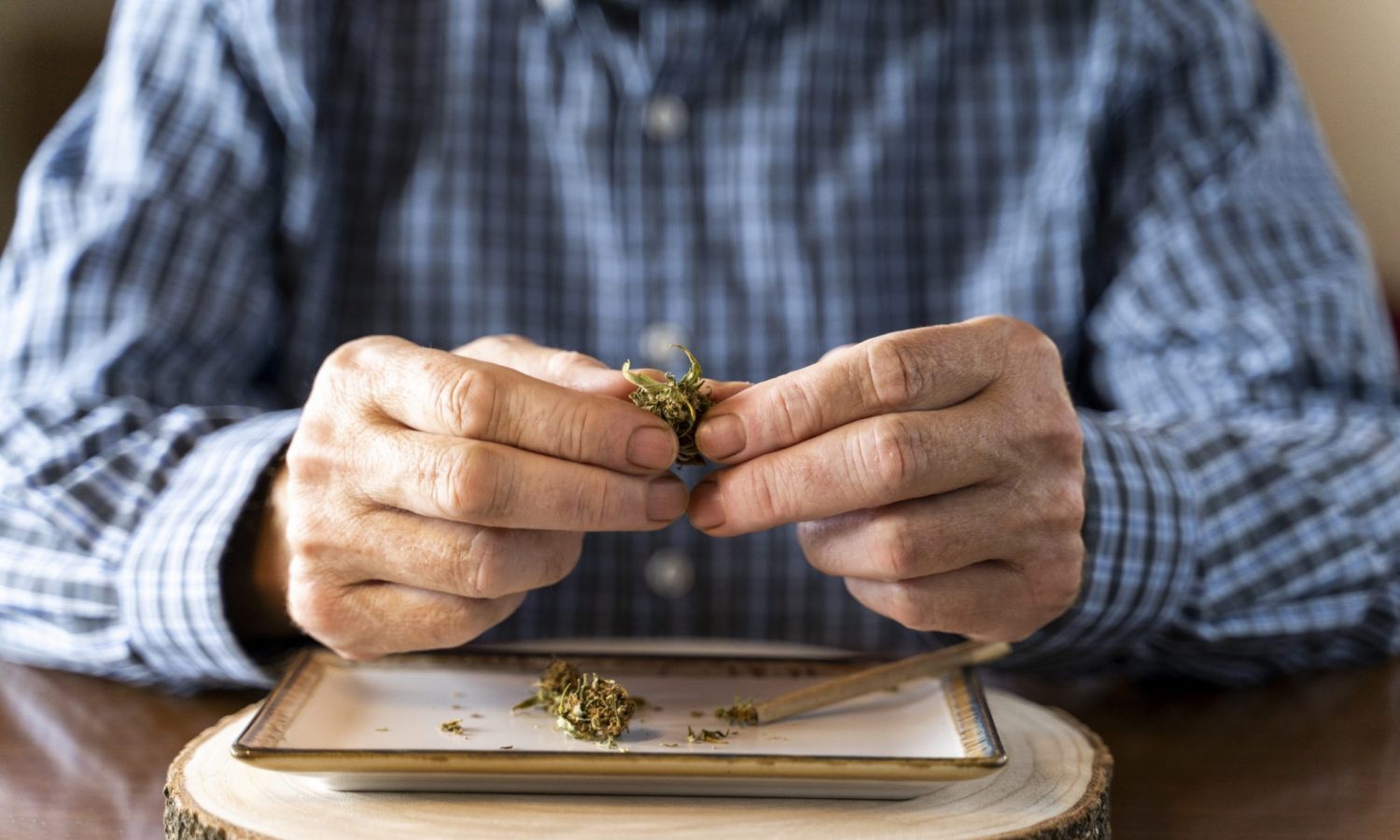Business
How Marijuana Affects Us Differently As We Age

With seniors becoming a crucial part of the retail market, it seems high time we understand the different ways marijuana impacts us as we age.
If you use cannabis regularly or have casually enjoyed it for many years, you may have noticed it affects you differently today than it did 5, 10 or even 20 years ago. A lot of this change may have to do with factors like tolerance, the weed itself or even life experience.
After all, once we get used to a substance it doesn’t quite feel the same as it once did, and it takes more of the substance to feel the similar effects. But there could be something else contributing to this change you feel. Your age might be one of the reasons that cannabis affects you differently today than it did when you were younger.

Marijuana use has increased significantly in the older demographics in the last several years. According to a 2020 study published in the JAMA Network, “Marijuana use in the prior year among people over 65 had jumped 75 percent from 2015 to 2018, from 2.4 percent of that group to 4.2 percent. By 2019, use had reached 5 percent.” With this steady increase in older folks getting high, it is more pertinent than ever to understand if and how marijuana use affects people differently based on age.
Cannabis use is only now starting to be widely studied and tested. It will take years of data and more cannabis decriminalization before we get the more nuanced answers to how marijuana affects us as we age. But while much more research must be done, with the limited research available, scientists are uncovering some very interesting findings – and some might even surprise you.
For one, there is memory and mental capacity to consider. You might think that as we get older, marijuana might mess with our memory and cognition more than it once did. After all, as we age, our minds aren’t exactly what they used to be. But this might not be the case when it comes to marijuana use. According to a 2021 study titled “Are the Acute Effects of THC Different in Aging Adults,” the results, and previous reports, actually differ from what you might think.
“Consistent with some reports in the preclinical literature, the findings suggest that older adults may be less sensitive to the effects of THC on cognitive and affective measures.” In other words, older users tended to keep their wits about them just fine (if not better) than younger adults. In the end, their findings suggest that “THC has an adverse impact on aspects of cognition in younger adults and that young adults are more susceptible to phenotypes of THC dependence.”

When it comes to cannabis and age, the curious results are not limited to just seniors and more “seasoned” cannabis users. There are also some studies that compare mature adult usage to adolescent cannabis usage. According to a 2019 study that examined age-related differences regarding cannabis use, adolescents showed a slightly more resilient memory than older users. “Human adolescents exhibited less impairment in memory post-intoxication than adults,” according to the study.
But while the younger users may have had less impairment, they found that younger users tended to crave cannabis more. “Craving and inhibitory control may not decrease as much after cannabis intoxication in adolescents compared to adults.” The authors also noted these trends were most noticeable among “very heavy and dependent users.”
More research is required in order to uncover more concrete evidence within these trends. Marijuana affects everyone differently, and the user’s age is a not-often researched, but clearly significant variable when it comes to THC and how we react to it.
Now, more than ever, this type of research is important. After all, more and more seniors (and adults in general) are reaching for cannabis instead of other substances. Even retailers are getting in on the trend. “Major retailers offer dispensary discounts of 10 to 20 percent on ‘Silver Sundays’ or ‘Senior Appreciation Days,’” according to the New York Times.
With seniors becoming a crucial part of the retail market, it seems high time we understand the different ways marijuana impacts us as we age.
Source: https://thefreshtoast.com/cannabis/how-marijuana-affects-us-differently-as-we-age/
Business
New Mexico cannabis operator fined, loses license for alleged BioTrack fraud

New Mexico regulators fined a cannabis operator nearly $300,000 and revoked its license after the company allegedly created fake reports in the state’s traceability software.
The New Mexico Cannabis Control Division (CCD) accused marijuana manufacturer and retailer Golden Roots of 11 violations, according to Albuquerque Business First.
Golden Roots operates the The Cannabis Revolution Dispensary.
The majority of the violations are related to the Albuquerque company’s improper use of BioTrack, which has been New Mexico’s track-and-trace vendor since 2015.
The CCD alleges Golden Roots reported marijuana production only two months after it had received its vertically integrated license, according to Albuquerque Business First.
Because cannabis takes longer than two months to be cultivated, the CCD was suspicious of the report.
After inspecting the company’s premises, the CCD alleged Golden Roots reported cultivation, transportation and sales in BioTrack but wasn’t able to provide officers who inspected the site evidence that the operator was cultivating cannabis.
In April, the CCD revoked Golden Roots’ license and issued a $10,000 fine, according to the news outlet.
The company requested a hearing, which the regulator scheduled for Sept. 1.
At the hearing, the CCD testified that the company’s dried-cannabis weights in BioTrack were suspicious because they didn’t seem to accurately reflect how much weight marijuana loses as it dries.
Company employees also poorly accounted for why they were making adjustments in the system of up to 24 pounds of cannabis, making comments such as “bad” or “mistake” in the software, Albuquerque Business First reported.
Golden Roots was fined $298,972.05 – the amount regulators allege the company made selling products that weren’t properly accounted for in BioTrack.
The CCD has been cracking down on cannabis operators accused of selling products procured from out-of-state or not grown legally:
- Regulators alleged in August that Albuquerque dispensary Sawmill Sweet Leaf sold out-of-state products and didn’t have a license for extraction.
- Paradise Exotics Distro lost its license in July after regulators alleged the company sold products made in California.
Golden Roots was the first alleged rulebreaker in New Mexico to be asked to pay a large fine.
Source: https://mjbizdaily.com/new-mexico-cannabis-operator-fined-loses-license-for-alleged-biotrack-fraud/
Business
Marijuana companies suing US attorney general in federal prohibition challenge

Four marijuana companies, including a multistate operator, have filed a lawsuit against U.S. Attorney General Merrick Garland in which they allege the federal MJ prohibition under the Controlled Substances Act is no longer constitutional.
According to the complaint, filed Thursday in U.S. District Court in Massachusetts, retailer Canna Provisions, Treevit delivery service CEO Gyasi Sellers, cultivator Wiseacre Farm and MSO Verano Holdings Corp. are all harmed by “the federal government’s unconstitutional ban on cultivating, manufacturing, distributing, or possessing intrastate marijuana.”
Verano is headquartered in Chicago but has operations in Massachusetts; the other three operators are based in Massachusetts.
The lawsuit seeks a ruling that the “Controlled Substances Act is unconstitutional as applied to the intrastate cultivation, manufacture, possession, and distribution of marijuana pursuant to state law.”
The companies want the case to go before the U.S. Supreme Court.
They hired prominent law firm Boies Schiller Flexner to represent them.
The New York-based firm’s principal is David Boies, whose former clients include Microsoft, former presidential candidate Al Gore and Elizabeth Holmes’ disgraced startup Theranos.
Similar challenges to the federal Controlled Substances Act (CSA) have failed.
One such challenge led to a landmark Supreme Court decision in 2005.
In Gonzalez vs. Raich, the highest court in the United States ruled in a 6-3 decision that the commerce clause of the U.S. Constitution gave Congress the power to outlaw marijuana federally, even though state laws allow the cultivation and sale of cannabis.
In the 18 years since that ruling, 23 states and the District of Columbia have legalized adult-use marijuana and the federal government has allowed a multibillion-dollar cannabis industry to thrive.
Since both Congress and the U.S. Department of Justice, currently headed by Garland, have declined to intervene in state-licensed marijuana markets, the key facts that led to the Supreme Court’s 2005 ruling “no longer apply,” Boies said in a statement Thursday.
“The Supreme Court has since made clear that the federal government lacks the authority to regulate purely intrastate commerce,” Boies said.
“Moreover, the facts on which those precedents are based are no longer true.”
Verano President Darren Weiss said in a statement the company is “prepared to bring this case all the way to the Supreme Court in order to align federal law with how Congress has acted for years.”
While the Biden administration’s push to reschedule marijuana would help solve marijuana operators’ federal tax woes, neither rescheduling nor modest Congressional reforms such as the SAFER Banking Act “solve the fundamental issue,” Weiss added.
“The application of the CSA to lawful state-run cannabis business is an unconstitutional overreach on state sovereignty that has led to decades of harm, failed businesses, lost jobs, and unsafe working conditions.”
Business
Alabama to make another attempt Dec. 1 to award medical cannabis licenses

Alabama regulators are targeting Dec. 1 to award the first batch of medical cannabis business licenses after the agency’s first two attempts were scrapped because of scoring errors and litigation.
The first licenses will be awarded to individual cultivators, delivery providers, processors, dispensaries and state testing labs, according to the Alabama Medical Cannabis Commission (AMCC).
Then, on Dec. 12, the AMCC will award licenses for vertically integrated operations, a designation set primarily for multistate operators.
Licenses are expected to be handed out 28 days after they have been awarded, so MMJ production could begin in early January, according to the Alabama Daily News.
That means MMJ products could be available for patients around early March, an AMCC spokesperson told the media outlet.
Regulators initially awarded 21 business licenses in June, only to void them after applicants alleged inconsistencies with how the applications were scored.
Then, in August, the state awarded 24 different licenses – 19 went to June recipients – only to reverse themselves again and scratch those licenses after spurned applicants filed lawsuits.
A state judge dismissed a lawsuit filed by Chicago-based MSO Verano Holdings Corp., but another lawsuit is pending.
Source: https://mjbizdaily.com/alabama-plans-to-award-medical-cannabis-licenses-dec-1/
-

 Business2 years ago
Business2 years agoPot Odor Does Not Justify Probable Cause for Vehicle Searches, Minnesota Court Affirms
-

 Business2 years ago
Business2 years agoNew Mexico cannabis operator fined, loses license for alleged BioTrack fraud
-

 Business2 years ago
Business2 years agoAlabama to make another attempt Dec. 1 to award medical cannabis licenses
-

 Business2 years ago
Business2 years agoWashington State Pays Out $9.4 Million in Refunds Relating to Drug Convictions
-

 Business2 years ago
Business2 years agoMarijuana companies suing US attorney general in federal prohibition challenge
-

 Business2 years ago
Business2 years agoLegal Marijuana Handed A Nothing Burger From NY State
-

 Business2 years ago
Business2 years agoCan Cannabis Help Seasonal Depression
-

 Blogs2 years ago
Blogs2 years agoCannabis Art Is Flourishing On Etsy













